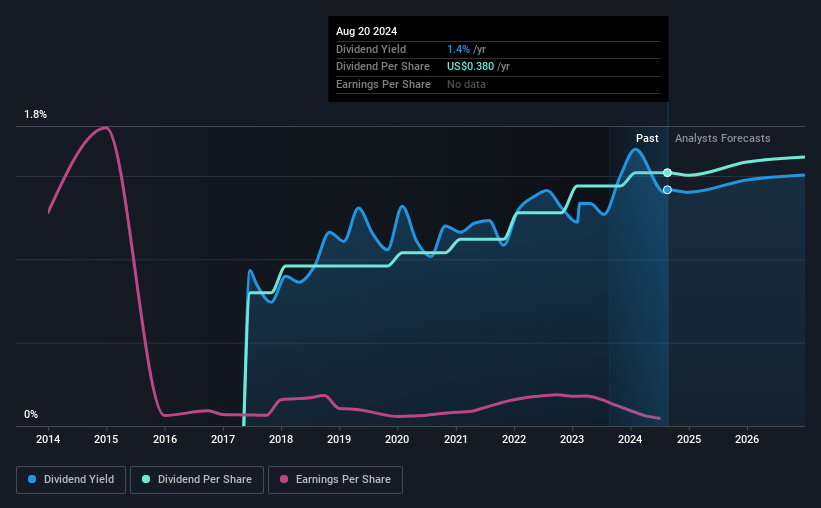- United States
- /
- Transportation
- /
- NYSE:SNDR
Schneider National (NYSE:SNDR) Is Due To Pay A Dividend Of $0.095
Schneider National, Inc.'s (NYSE:SNDR) investors are due to receive a payment of $0.095 per share on 8th of October. This means the dividend yield will be fairly typical at 1.4%.
Check out our latest analysis for Schneider National
Schneider National's Dividend Is Well Covered By Earnings
We like to see a healthy dividend yield, but that is only helpful to us if the payment can continue. The last payment was quite easily covered by earnings, but it made up 533% of cash flows. While the company may be more focused on returning cash to shareholders than growing the business at this time, we think that a cash payout ratio this high might expose the dividend to being cut if the business ran into some challenges.
The next year is set to see EPS grow by 186.7%. If the dividend continues on this path, the payout ratio could be 12% by next year, which we think can be pretty sustainable going forward.

Schneider National Is Still Building Its Track Record
Schneider National's dividend has been pretty stable for a little while now, but we will continue to be cautious until it has been demonstrated for a few more years. The annual payment during the last 7 years was $0.20 in 2017, and the most recent fiscal year payment was $0.38. This works out to be a compound annual growth rate (CAGR) of approximately 9.6% a year over that time. Schneider National has been growing its dividend at a decent rate, and the payments have been stable. However, the payment history is very short, so there is no evidence yet that the dividend can be sustained over a full economic cycle.
The Dividend Has Limited Growth Potential
Investors who have held shares in the company for the past few years will be happy with the dividend income they have received. Unfortunately things aren't as good as they seem. Earnings per share has been sinking by 12% over the last five years. Such rapid declines definitely have the potential to constrain dividend payments if the trend continues into the future. On the bright side, earnings are predicted to gain some ground over the next year, but until this turns into a pattern we wouldn't be feeling too comfortable.
Schneider National's Dividend Doesn't Look Sustainable
Overall, it's nice to see a consistent dividend payment, but we think that longer term, the current level of payment might be unsustainable. While Schneider National is earning enough to cover the payments, the cash flows are lacking. Overall, we don't think this company has the makings of a good income stock.
Market movements attest to how highly valued a consistent dividend policy is compared to one which is more unpredictable. However, there are other things to consider for investors when analysing stock performance. As an example, we've identified 1 warning sign for Schneider National that you should be aware of before investing. Looking for more high-yielding dividend ideas? Try our collection of strong dividend payers.
New: Manage All Your Stock Portfolios in One Place
We've created the ultimate portfolio companion for stock investors, and it's free.
• Connect an unlimited number of Portfolios and see your total in one currency
• Be alerted to new Warning Signs or Risks via email or mobile
• Track the Fair Value of your stocks
Have feedback on this article? Concerned about the content? Get in touch with us directly. Alternatively, email editorial-team (at) simplywallst.com.
This article by Simply Wall St is general in nature. We provide commentary based on historical data and analyst forecasts only using an unbiased methodology and our articles are not intended to be financial advice. It does not constitute a recommendation to buy or sell any stock, and does not take account of your objectives, or your financial situation. We aim to bring you long-term focused analysis driven by fundamental data. Note that our analysis may not factor in the latest price-sensitive company announcements or qualitative material. Simply Wall St has no position in any stocks mentioned.
About NYSE:SNDR
Schneider National
Provides multimodal surface transportation and logistics solutions in the United States, Canada, and Mexico.
Adequate balance sheet with moderate growth potential.
Similar Companies
Market Insights
Weekly Picks

Solutions by stc: 34% Upside in Saudi's Digital Transformation Leader


The AI Infrastructure Giant Grows Into Its Valuation
Recently Updated Narratives
Many trends acting at the same time


Engineered for Stability. Positioned for Growth.


Staggered by dilution; positions for growth
Popular Narratives


MicroVision will explode future revenue by 380.37% with a vision towards success


NVDA: Expanding AI Demand Will Drive Major Data Center Investments Through 2026



